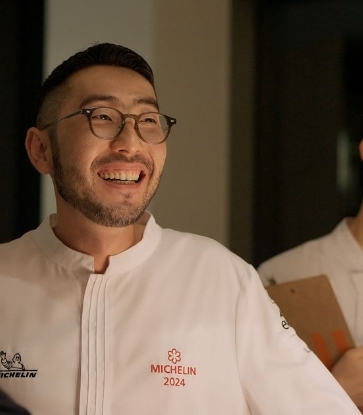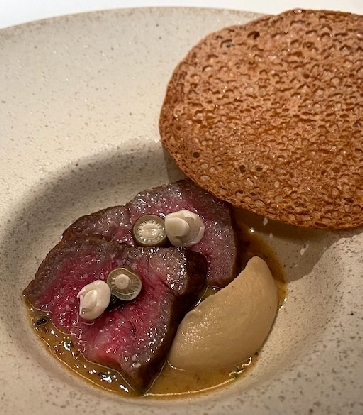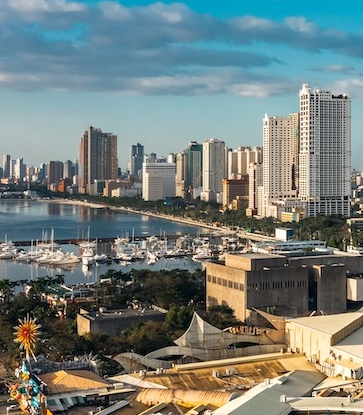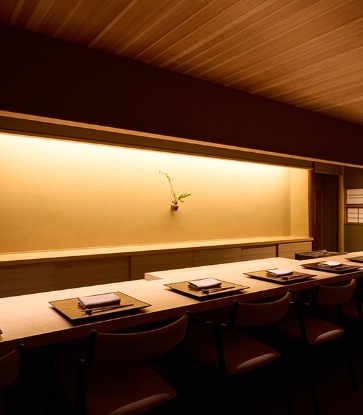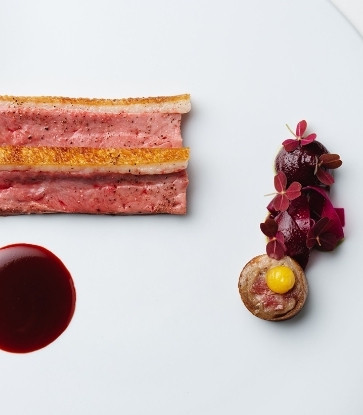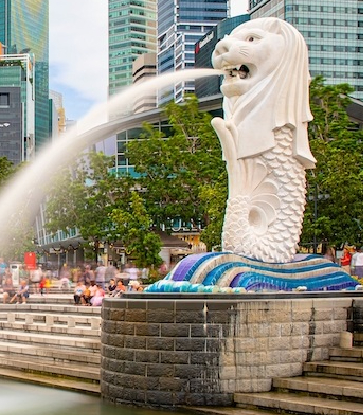Food lovers often mention founder and co-owner René Redzepi in the same breath as newly awarded three-MICHELIN-starred Noma in Copenhagen, but only a handful of may know that at the helm of its daily kitchen operations is a youthful Singapore-born head chef, Kenneth Foong.
The calm, collected, and soft-spoken 32-year-old was tapped on for the top job in October 2020, just nine months after he joined the restaurant as a full-time staff — making him Noma's first Asia-born head chef.
Foong's culinary journey formally started in 2009, and he credits Taiwanese chef André Chiang of two-MICHELIN-starred RAW in Taipei and now-defunct two-MICHELIN-starred Restaurant André in Singapore for being pivotal to his first foray into fine dining. “When I first started cooking, I just worked at a bistro. I remember reading in the newspaper that Chiang was leaving JAAN in Singapore and starting his own place (Restaurant André), and I was like, ‘I have to work for this guy’. I actually sent him three emails before he replied,” Foong shares.
After his time at Restaurant André in Singapore, Foong flew to the United States where he studied at the Culinary Institute of America and, in 2011, was bestowed the coveted opportunity to work at three-MICHELIN-starred Eleven Madison Park in New York. In 2016, Foong returned to Singapore and worked as head chef of one-MICHELIN-starred CURE before heading to Copenhagen in 2018 to pursue an internship at Noma.

From Intern to Head Chef
“I came to Noma quite late into my career. This was in 2018, after 12 to 13 years of cooking, so I was quite aware of what to expect, especially knowing what people said about it. I was very careful to manage my expectations accordingly. I knew it was going to be tough and probably one of the hardest restaurants that I would have to work in,” shares Foong.
“Noma is very special in the sense that there is no other restaurant with a system quite comparable to ours,” Foong continues. As an intern, Foong says that one gets thrusted into the production kitchen with 30 other interns, a couple of chefs de partie and sous chefs, while everything is moving at a rapid-fire pace. Foong reminisces: “The best way I can describe it is like watching an old black-and-white movie with actors running around but with no sound. It was like a perfectly orchestrated ballet. There was also a very palpable energy and intensity."
“It was like a hurricane in the best possible way.”

The opportunity to take over the position of Head Chef arose last year, when former head chef, Canadian Benjamin Ing, announced his departure. Noma's management team then agreed on Foong, who was working full-time by then, as the most ideal candidate to take on the head chef role.
When asked if he was intimidated by the opportunity of leading one of the world's most recognised kitchens, Foong cites Korean-American chef-restaurateur Corey Lee of three-MICHELIN-starred Benu as a role model. Prior to opening Benu, Lee worked for almost a decade under three-MICHELIN-starred The French Laundry under Thomas Keller.
“Corey Lee was always a monumental figure for me because when I was starting out, there were not many Asian leaders in the industry, especially Asian chefs who were stepping out and trying to do something that was uniquely their own.”
"In my eyes, he was a force to be reckoned with, while at the same time, he was this picture of a calm, cool, collected man — like a warrior monk, and I wanted to be that kind of chef," shares Foong. "I had the opportunity to work at Benu for a few days while I was in between jobs, and last year, I had the opportunity to cook for him here at Noma. He still remembered me and gave me a big hug when he walked through the door. It was very nice to see him again and to hear him say these nice things about the restaurant; it was very validating."
Building a team of "incredible human beings”
Another mentor in his career is, of course, Redzepi himself. When asked about his working relationship with Noma’s chef/owner René Redzepi, Foong describes it as “incredible”. He adds: “René’s a genius in his own right, and trying to understand the how and why behind the things he does is a lesson in itself.” According to Foong, aside from making sure that the Noma kitchen is running smoothly, a larger part of his responsibility involves tasks such as organising teams, finding solutions, spotting problems before they happen, and coming up with worst-case and best-case scenarios.

He adds: “Let’s say, in basketball, if you hire someone who only wants to keep shooting hoops and is not wanting to pass the ball, then you're never going to win. You might score two points, but the game will be lost. At the end of the day, it’s about the team winning together. That's what we believe here in Noma. It's always about the team. We are a team of incredible human beings, I would say.”
Balancing Fun And Focus
"Now, it may seem like we’re a very serious and uptight bunch, but this is not the case at all," says Foong. During his days as an intern, Foong remembers walking into the Noma kitchen with Jay-Z playing on full-blast. “There was a lot of rapping and a lot of fist bumping. Jay-Z is one of my favourites. Lupe Fiasco is up there, too, along with Wu-Tang Clan, Biggie [Smalls], and Tupac [Shakur]. Those are my staples,” he shares. “Everyone was so intense about work, but they also never took themselves too seriously. They knew how to have a good time, how to pump up the music and get ready to go, and then, when service hits, suddenly everything magically settles. It’s like dropping a rock into completely calm water and hearing the echo. The food comes out, the service is seamless. It really is a sight to behold. ”
“We know how to have a good time. I love rap, and I play a lot of rap music myself before service starts. We’d fist bump and rap along. It’s a lot of fun.”
On Choosing a Chef’s Route Over a Musician's Path
If Foong wasn’t helming the famed Nordic restaurant’s revered kitchen, he would most probably be pursuing an alternate career as a jazz musician, playing double bass and electric bass. “I was very invested in the idea [of being a musician], but I realised that my practice hours weren’t enough. When the time came to decide what career path I wanted to pursue, I wasn’t one-hundred-percent sure if I wanted it to be music, so I decided to cook instead,” he shares.
“It seems like cooking was the Plan B of my career, but it really isn’t.”
Foong fondly recalls childhood memories spent with his parents in their kitchen in Singapore, either cooking with his mother or baking with his father. He says: “Everything became clear in a sense that I knew I could do something with my hands and bridge that with my ability to make people happy. I was in my late teens, and even then, no one is really so sure at that age what they want to become. So, I simply started working in a restaurant, and that experience solidified my career path. It’s really hard, working 16 to 18 hours a day. But I found myself completely in love with cooking and wanting to learn more. That’s when I realised I could actually do it for a living.”
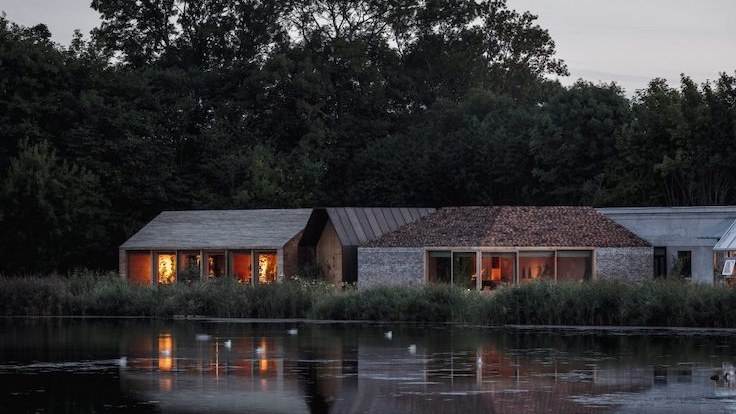
A Taste of Home
Having lived in three different places for most of his life — Singapore, New York, and now, Copenhagen — Foong shares that his idea of home is not necessarily tied to a geographical location or a physical space. Rather, he defines home as the way a place fits into his heart. “That’s why there are many different places I would call home,” he shares.
His enviable professional trajectory that has taken him through the world's most dynamic cities and the industry's most coveted kitchens has, in fact, given him a more profound appreciation of the flavours he grew up with. "I believe Singaporean street food is the ultimate example of accessibility, of convenience, and of deliciousness. Everything is so tasty, and you don’t realise that until you fly away and learn that there is a lack of this style of food. In Singapore, I can just grab chicken rice for less than US$3 at any time of the day and be blown away."
"Nothing beats that," he adds.
Congratulations to Noma on getting 3 MICHELIN Stars! What do you think helped the team to earn this accolade?
Honestly, it was never something we planned for. Especially with the pandemic in mind, it was very much just refining the process, figuring out what feels right, and constantly restructuring the Noma experience. Independent of any sort of achievement that we wanted to get or any kind of end goal, we just wanted to be happy. I’d like to believe that we just happened to be the iteration of what felt right with the MICHELIN Guide, and it was, of course, a very welcome coincidence.
What drives you as a chef?
It’s tremendously important to me that I can go to work, not because I have to go to work, but because I want to go to work. If I can wake up everyday, looking forward to dicing an onion, knowing that my actions will bring value to the culinary industry and provide the opportunity to create a restaurant experience that allows diners to forget about everything that's going on in the outside world and make them happy — this, for me, makes me happy, too. I believe this is a very understated role that we have as chefs and professionals in the restaurant industry, so that, in effect, also makes it a priority.
Of course, also spending time with my wife and my dog Pancho, taking care of myself, and making sure I can keep doing what I’m doing at 60 instead of burning out by the time I get to 40.
Do you have any guiding principles?
It’s not a guiding principle, but I do my best to be deliberate and mindful of everything I do. Whether it’s making a decision, speaking to my team, or approaching a dish in a certain way, I try to understand the repercussions of everything I do and to be aware of what it means to me and those around me.
When was your first encounter with the MICHELIN Guide?
What really got me into it [the MICHELIN Guide] was when I started working at Restaurant André in Singapore. I remember going for an interview with André [Chiang]. I went inside his library, and he had a collection of MICHELIN Guides from the 80s — all these little red books lined up, and back then, they were still paperbacks. I would dare to say, I think that was what started it all.
Can you describe your favourite memory at a MICHELIN-starred restaurant?
I have a couple. The first, I remember, was within my first year in New York, right before Christmas. I went for lunch with a friend at Eleven Madison Park and decided to drop off our resumes there after. You hear stories about what a 3 MICHELIN Star restaurant is supposed to be like, and yet, everything is theoretical until you step into the building. It was out of this world; it was like being in Disneyland for the first time because you see everything together and not just in sentences. The flow of how seamlessly everybody moved around the dining room and the air of professionalism was incredible.
Also, one afternoon when I was already working at Eleven Madison Park, I was left to pick up the slack from a colleague who decided to end his shift early but with 70 artichokes to trim. I was in distress! I had this colleague, Sunny, who was supposed to take the afternoon off, but instead, she came to me and said, ‘hey, you're doing a really good job, let me help you with those artichokes’. It was such a simple yet kind gesture that I will always remember forever. It made me believe in the kindness of humanity, especially in this immensely competitive industry.
Any advice to young chefs?
It's a very different time now from when I started. I would say the basics such as paying your dues, but also understanding what you want as an individual, and as a chef. I believe it’s important to know that now more than ever before. I am now at a stage in my life where I just want to do the things that matter to me or things that make me happy. If I realised those things early on, I would have probably made some better life decisions. As a young chef, it’s not easy to already know what you want, so approach everything with an open mind and, of course, be respectful.
What staff meals do you prepare for the Noma team?
Food is a big part of family, so when it’s my turn to cook family [or staff] meals for the Noma team, I usually prepare braised pork belly cooked in soy sauce, bok choy, and steamed rice. Sometimes, it’s sweet and sour pork.
Growing up, I would always prepare claypot braised pork belly with soy sauce with my mom, and I still actually make it now at home [in Copenhagen]. I prepare a huge amount and just pop it in the microwave. Another dish that I still prepare to this day is fried rice cooked in the style of Taiwanese Bib Gourmand restaurant Din Tai Fung's. It's actually one of the dishes I loved making when I was in New York.
How do you unwind?
I cycle a lot, especially outside Copenhagen; it’s really picturesque outside the city. I also spend a lot of time with my dog, Pancho, who my wife and I rescued in Mexico City. He was six or seven weeks old when we brought him back to Copenhagen. He's basically our child. My wife and I also have picnics with Pancho and bring a bottle of wine along. I also meditate to build mental strength, fortitude, and focus.
What’s your pantry staple?
Oh man, this is going to be such a polarising thing to say, but I love chicken powder. MSG-laden chicken powder is the staple that I constantly have in my kitchen. I put it in everything, especially if you only have 30 minutes or an hour to make a dish that goes a long way; it really does help. I also always have a bottle of light soy sauce; it's all the umami-laden products that I'm in love with.
What’s next for you?
Honestly, I don’t know. I’m not trying not to rush into things, and I certainly don’t want to rush into something I'm not one-hundred-percent sure of or committed to. I would love to cycle around the world someday and spend time with my wife and dog. About what’s next? I’m not sure at all, and for the first time in my life, I am okay with that.
All photos are from Noma. Header image is from Kenneth Foong.




